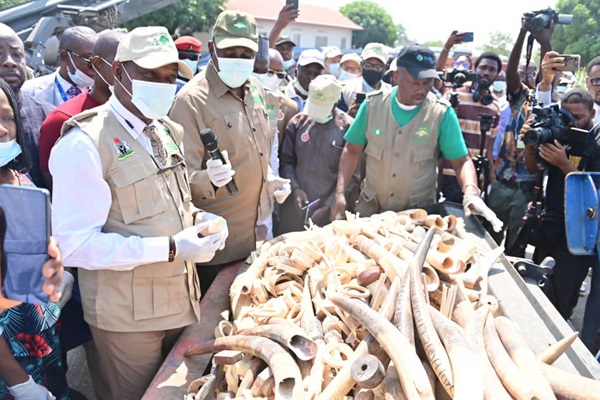
In a resounding commitment to combat illegal wildlife trade (IWT), the National Environmental Standards and Regulations Enforcement Agency (NESREA) has reaffirmed Nigeria’s zero tolerance for this illicit activity.
The Minister of State for Environment, Dr. Iziaq Salako emphasised this stance during the official public disposal of the accumulated confiscated wildlife stockpile on January 9, 2024, in Abuja.
Salako, delivering a keynote address, underscored Nigeria’s dedication to the fight against wildlife crime and its unwavering commitment to international obligations aimed at protecting biodiversity. The event marked the symbolic disposal of approximately 2.5 tonnes of ivory and elephant tusk specimens, conducted in collaboration with key partners such as the Elephant Protection Initiative (EPI) African Fund, the US Embassy, United Nations Office on Drugs and Crimes (UNODC), Wildlife Conservation Society (WCS) and Wild African Fund.
“The symbolic disposal exercise of confiscated wildlife stockpiles under the custody of NESREA is to show the entire world that Nigeria is zero tolerant to illegal wildlife trade at any level,” stated Salako.
Citing compliance with the Convention on International Trade in Endangered Species of Wild Fauna and Flora (CITES) Resolution Conf. 9.10 (Rev. CoP15) and Conf. 10.7 (Rev. Cop 15) on disposal of seized and confiscated live and dead wildlife specimens, Salako outlined Nigeria’s choice of outright destruction for these stockpiles. The pulverisation of elephant tusks and ivories, along with the earlier incineration of pangolin scales and other skin products in October 2023, serves as a potent message against illegal wildlife trade.
“Nigeria is zero tolerant to illegal wildlife trade at any level and [this action] will serve as a deterrent to the illicit wildlife traffickers who use Nigeria as their transit route,” he emphasised.
Salako explained that Nigeria, as a party to various international environmental agreements addressing climate change, has opted for the pulverisation method to dispose of the elephant tusks. He reiterated NESREA’s commitment to environmental stewardship and the reduction of the impact of climate change on human health and the environment.
Highlighting the alarming issue of poaching hubs, Salako identified the Democratic Republic of Congo, Cameroon, Burkina-Faso and Ghana as key areas. Nigeria, with several unconfirmed transportation routes, has become a transit route for illegally acquired wildlife specimens, transported via buses, trucks and canoes. NESREA, through collaborative efforts with relevant stakeholders, has made strides in combating IWT in Nigeria, leading to seizures, confiscations and the prosecution of wildlife offenders.
The minister addressed the imperative need for more space in holding facilities to accommodate future seizures. He emphasised the importance of avoiding the contraction and spread of zoonotic diseases, underlining the need to send a strong and unambiguous signal of non-tolerance to illegal wildlife trade. The symbolic disposal event, therefore, serves not only as a deterrent but as a powerful statement of Nigeria’s commitment to preserving its rich biodiversity and protecting global wildlife.


